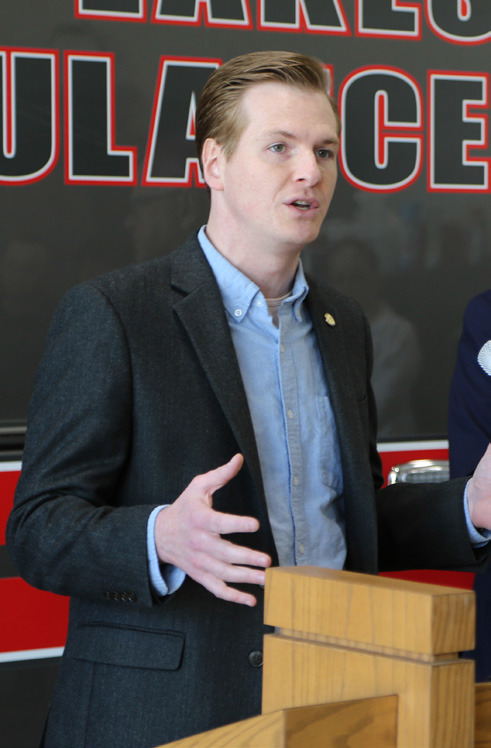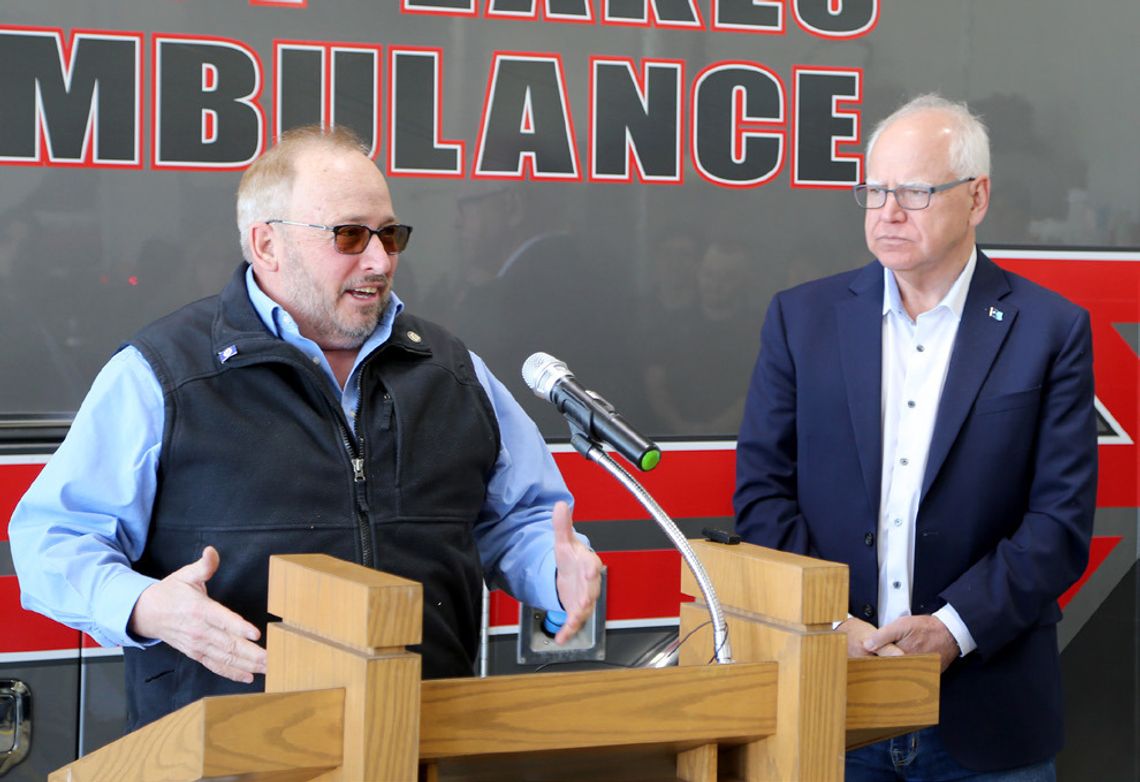Governor inks $30 million package during ceremony on the Range
Gov. Tim Walz came to the Iron Range to sign legislation that bolsters rural ambulance services in rural Minnesota.
Flanked by a bipartisan group of lawmakers, including Ely Republican Roger Skraba and northeastern Minnesota Democrats Grant Hauschild and Dave Lislegard, Walz put his signature on emergency services legislation that provides over $265,384 to Ely’s ailing ambulance service and $30 million statewide.
“This was hard work, good work,” said Walz. “This is the work constituents want us to do. This is the legislation they want us to sign.”
In the waning hours of the legislative session, legislators struck a deal that provides aid to rural ambulance services.
While the $30 million package was for short of totals proposed earlier by Hauschild, those gathered at Hoyt Lakes called the measure a good first step and called it the beginning and not the end of state review of ambulance funding issues.
“This isn’t just one and done,” said Liselgard, a DFL State Rep. from Aurora. “This isn’t get the money and move on. This is about fundamental and structural change. What worked 20 or 30 year sago doesn’t work anymore.”
Skraba said that legislators on both sides of the political aisle recognized “we have to do something” about rural ambulance funding and cited his own dealings with issue when he served previously as Ely’s mayor.
State Sen. Judy Seeberger (D-Afton) brought her own experience to the issue from her work as a paramedic and said the issue is “something that needed to be addressed and needed attention for so long. We’re not done. This is the beginning.”
The $264,384 headed to Ely, as well as allocations ranging from $106,000 to $163,000 going to ambulance operations in nearby Babbitt, Tower, Cook, Orr and Hoyt Lakes, is part of an effort to get funding where it’s most needed in the state.
The legislation excluded ambulance operations in the Twin Cities metropolitan areas as well as those in major hubs including Duluth, St. Cloud and Rochester, where ambulance services remain profitable.
“We’re facing a true crisis in greater Minnesota,” said Hauschild, a first-term State Senator from Hermantown whose district includes Ely and several neighboring communities. “Especially here in northeastern Minnesota. We have further distances. We have an aging population. We have workforce challenges where we can’t get the volunteers we used to be able to get.”
Currently, ambulance services locally are provided by the non-profit Ely Area Ambulance Service, but that organization has needed cash infusions from local units of government to stay afloat.
The ambulance issue has dominated local political discussions for several months, with Ely-Bloomenson Community Hospital commissioning a study to look at options.
Lislegard said the challenges faced in northeastern Minnesota “helped drive the conversations” of a task force convened to address the issue and helped lead to the legislation passed this year.
Several legislators spoke of the importance of ambulance service and that rural areas face more difficult issues in supporting and maintaining it than higher- populated metropolitan areas.
Some of the obstacles, including federal reimbursement rates, remain and the legislators promised to continue the debate.
“It’s all about how we are going to make this good,” said State Rep. John Huot (D-Rosemount). “The whistle you blew is going to make a big change across this state.”
Ambulance service employees from across the Iron Range, including Ely, Tower, Cook, Aurora and Hoyt Lakes, were among those present for the ceremony.
They joined the legislators and Walz, who came from an event at Hibbing earlier in the morning, to celebrate approval of the legislation.
“For now, we’ve stopped the bleeding,” said Hauschild.
Walz stressed the cooperation of the legislature in addressing the issue.
“I think it should be noted where it’s easy to criticize something hard, this group figured on a way, bipartisan, to tacke a tough subject and listen to people and get it over the finish line while figuring out how to responsibly fund it.” said Walz.

.jpg)










